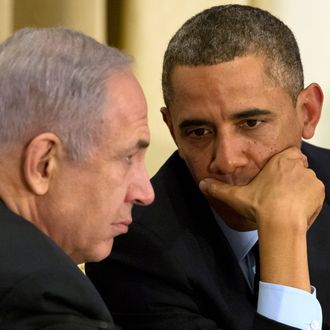
Three days have passed since the United Nations Security Council voted 14-0 to adopt a resolution demanding an end to Israel’s building of settlements in the West Bank, and Israeli prime minister Benjamin Netanyahu remains very, very angry about it.
Over the weekend, Netanyahu canceled monetary contributions to five U.N. agencies and suspended business with the embassies of 12 of the nations that approved the resolution: the U.K., France, Russia, China, Japan, Ukraine, Angola, Egypt, Uruguay, Spain, Senegal, and New Zealand (Security Council members Venezuela and Malaysia don’t have diplomatic relationships with Israel). Ambassadors from those countries also reportedly received “personal rebukes.” “This is a responsible, measured and vigorous response, the natural response of a healthy people that is making it clear to the nations of the world that what was done at the U.N. is unacceptable to us,” said Netanyahu. “Israel is a country with national pride, and we do not turn the other cheek.” As CNN, which first reported the news, noted, the move was largely symbolic, as “it does not affect trade, security coordination, or other aspects of the relations,” though it has so far resulted in the cancellation of meetings with the Senegalese foreign minister and the prime minister of Ukraine, the recalling of Israeli envoys in Senegal and New Zealand, and the withholding of aid to Senegal.
But Netanyahu seems to have reserved most of his ire for the United States, which abstained from the Security Council vote — thereby declining to veto the resolution, as it has long done with similar measures. While he didn’t make any formal changes to Israel’s relationship with the U.S., he called American ambassador to Israel Daniel Shapiro to Jerusalem for a “scolding.” In a public statement, he accused the U.S. of a “shameful ambush,” saying, “As I told John Kerry on Thursday, friends don’t take friends to the Security Council.” He then took it a step further by alleging that President Obama was directly responsible for the resolution’s existence: “From the information we have, we have no doubt that the Obama administration initiated it, stood behind it, coordinated on the wording and demanded that it be passed.”
The White House denied that accusation, with deputy national security adviser Ben Rhodes telling reporters, “We did not draft this resolution; we did not introduce this resolution. We made this decision when it came up for a vote.” Unsurprisingly, that didn’t stop Netanyahu’s representatives from doubling-down on their boss’s claim. “They not only did not get up and stop it, they were behind it from the beginning,” insisted Israeli ambassador to the U.S. Ron Dermer. “This is why the prime minister is so angry.”
Meanwhile, Netanyahu spokesperson David Keyes claimed to have “rather ironclad information from sources in both the Arab world and internationally that this was a deliberate push by the United States.” But he refused to share that information — apparently because it’s being saved for Donald Trump. “It’s something that should be shared with the new administration and that’s their choice whether they want to share it or not,” said Keyes, later adding, “We look forward to working with the incoming administration.” The feeling appears to be mutual.





























